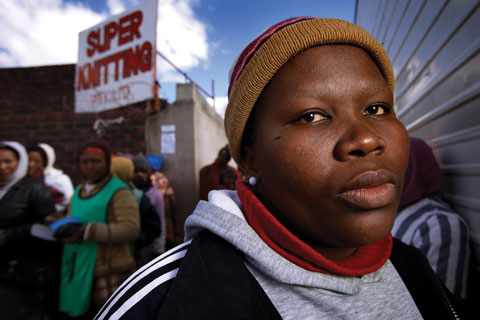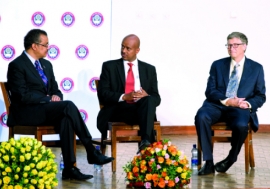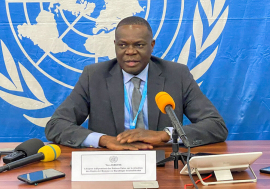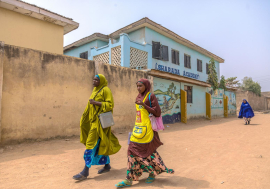Lesotho’s economy catches flu — from big brother’s sneeze
Lesotho’s economy catches flu — from big brother’s sneeze
 Garment factory in Lesotho’s capital, Maseru: With some companies already closing because of weak global demand, there are some worries about impending changes in US trade regulations.
Garment factory in Lesotho’s capital, Maseru: With some companies already closing because of weak global demand, there are some worries about impending changes in US trade regulations.For decades the tiny landlocked mountain kingdom of Lesotho has relied heavily on its giant neighbour, South Africa, to advance — until now. South Africa’s economic difficulties are placing Lesotho’s economy at a crossroads, as the government struggles to push big rocks up the mountain to balance the national budget.
There is plenty of evidence of South Africa’s heavy presence. It employs thousands of Basothos (nationals of Lesotho) as migrant labour, buys water from a project that in turn generates enough electricity to meet Lesotho’s needs and generously shares revenue from a customs union that contributes significantly to the tiny kingdom’s budget. Moreover, South African companies are active in other sectors, including retail trade, insurance and banking.
Now the economic outlook is shifting as the rocks slip back down the mountain. Despite modest gains over the years, Lesotho remains one of the world’s poorest countries. The 2011/12 budget was “the most difficult the government had to put together,” reckons Finance Minister Timothy Thahane. His worries include a slowdown in economic growth, rising unemployment and diminishing revenues from migrant workers who are losing jobs in South Africa. Lesotho also faces declining agricultural production, falling life expectancy and high HIV infection rates.
As if all this were not enough, a dip in South Africa’s economic fortunes has forced Lesotho to rethink how to navigate the economy. It is wrestling with a 30 per cent decline in domestic revenues and a monstrous 15 per cent budget deficit in the 2011/12 financial year. The government expects to fund the gap with loans from international financial institutions and foreign aid from donor partners.
Declining remittances
A steep decline in last year’s takings from the Southern African Customs Union (SACU) punched the biggest hole in the budget. SACU, the oldest customs union in the world (it recently celebrated its hundredth anniversary), maintains free trade among members — South Africa, Botswana, Lesotho, Swaziland and Namibia — and charges non-members a common external tariff. Revenues are shared among members from a common pool run by South Africa under an agreed-upon formula. Since 1969, SACU receipts have been contributing more than half of Lesotho’s budget revenues.
“As a country, we were overly aware that about 60 per cent of the government’s budget is funded by SACU,” Central Bank Governor Retselisitsoe Matlanyane told a local magazine, Visions, in early 2011. Thanks to the recent global financial meltdown, trade among SACU members has fallen considerably, cutting by half Lesotho’s customs receipts.
Worse still, dwindling remittances from migrant workers in South Africa have dealt another blow. With an economy inextricably linked to a neighbour that geographically encircles it, Lesotho is highly dependent on these remittances. The World Bank’s Migration and Remittances Factbook 2011 shows that out of Lesotho’s 2.1 million people, about 457,500 were living outside the country in 2010. As the largest source of foreign exchange, remittances contribute an estimated US$525 million or 30 per cent of Lesotho’s GDP in 2010, says the report.
Despite the current upsurge in global mineral prices, there has been a mild recession in South Africa over the past few years. That in turn has had a major impact on Lesotho by forcing employers, especially mining companies, to retrench thousands, including Basotho migrants — thereby cutting the remittances they send back home.
More budget red ink
The textiles industry too has taken a beating. Low demand for garments in the US has shrunk earnings and contributed to the red ink in the budget. Under a US law, the African Growth and Opportunity Act (AGOA), Lesotho has emerged as one of sub-Saharan Africa’s largest garments exporters to the US. AGOA allows qualifying African countries to sell textiles duty-free to the US. Yet a strong South African rand — to which Lesotho’s national currency, the loti, is pegged — has hurt the competitiveness of Lesotho’s second largest employer.
Furthermore, authorities worry about the potentially negative impact on the textile industry if a clause in the AGOA law is not renewed when it expires in September 2012. The clause permits AGOA-eligible countries, especially Lesotho and Kenya, to source fabrics from third-party countries such as China and still benefit from AGOA.
“I believe our main challenge will be the expiration of [AGOA], given that the textile industry currently employs 45,000 in the country,” said the Central Bank governor, Mr. Matlanyane. Earnings from textile exports make up a fifth of Lesotho’s GDP. Already, some garment manufacturing companies have closed because of weak demand.
The picture from agriculture is even less reassuring. Three in four Basothos eke out a living from subsistence farming. But the contribution of grain harvests to the GDP has dropped sharply from 4.8 per cent in 2000 to a measly 1.8 per cent in 2010, says Mr. Thahane. The UN has warned that crop production “is declining and could cease altogether over large tracts of the country if steps are not taken to reverse soil erosion, degradation and the decline in soil fertility.”
 Building one of the tunnels of the Lesotho Highlands Water Project, which supplies water to South Africa and is one the mountain nation’s biggest sources of income.
Building one of the tunnels of the Lesotho Highlands Water Project, which supplies water to South Africa and is one the mountain nation’s biggest sources of income.Selling 'white gold'
Despite the litany of economic hardships, Lesotho has until now done reasonably better than some in the neighbourhood, like Swaziland and Zimbabwe. There are a few silver linings, which, if current policies to steer the economy in a different direction succeed, could change fortunes.
To its credit, the government now realizes the hazards of relying too much on traditional sources of revenue. In his budget speech, the finance minister unveiled new policies to revive agriculture, diversify export products and markets and attract investors by relaxing foreign investment laws. Still, such policies can bring relief only if the economies of the country’s key trading partners — the US, European Union and South Africa — recover.
Water is Lesotho’s “white gold,” as Basothos fondly call it. Income from the sale of water from the Lesotho Highlands Water Project is expected to increase with the construction of the Metolong Dam and its spin-offs.
Under the water project, created in partnership with South Africa, Lesotho exports water to its neighbour’s Gauteng province through a series of dams and tunnels blasted through the mountains. Gauteng, the hub of South Africa’s economy, has little water of its own and therefore needs Lesotho to quench its thirst. As a double benefit, the multi-billion-dollar project also generates enough hydroelectric power to meet about 90 per cent of Lesotho’s energy needs.
Diamonds spark hope
Lesotho could also count on a decent windfall from mining exports as global mineral prices continue to go up. Income from diamonds, while still negligible, is growing. The government plans to generate additional funds by cutting and polishing the diamonds at home, which is a departure from current practice.
Further, a modest rise in SACU revenues is predicted for 2012. Its scope, however, will depend largely on a new revenue-sharing formula now under review. Also, US lawmakers have introduced a bill to extend AGOA. If, as expected, the bill is passed, Lesotho will be assured of a steady flow of income from textile exports to the US, assuming the latter’s economy continues to recover.
Lesotho has likewise shown renewed interest in attracting investors. The World Bank’s 2011 Doing Business report, which ranks countries’ business-friendly policies, grades Lesotho at a dismal 138 out of 183 countries. If it relaxes business restrictions, the government could easily lure investors into the mining, textile and retail industries.
Nevertheless, huge challenges lie ahead, including the likelihood of yet another global recession, which could upset many of Lesotho’s well-crafted economic plans. But at least for now, the tiny mountain kingdom appears to have grasped the perils of unbridled reliance on South Africa’s magnanimity.
Lesotho and the UN: partners in development
Perhaps not surprising, Lesotho is one of the countries not expected to achieve the Millennium Development Goals (MDGs) by the 2015 deadline. The goals are a set of eight economic and social targets agreed upon by world leaders at the turn of the new millennium. They include targets for reducing poverty and hunger; providing better access to health care, water and education; creating equal opportunities for women; and protecting the environment.
With just three years to the deadline, Lesotho’s scorecard ranks it unimpressively below average: it is on track to meet two of the eight goals (education and women’s rights), showing painfully slow progress in three (HIV/AIDS, environment and global partnerships) and off track on another three (poverty reduction, maternal care and child health).
Fighting HIV/AIDS and reducing poverty rank high on the list of priorities, the UN’s resident coordinator in Lesotho, Ahunna Eziakonwa-Onochie, told Africa Renewal. “With those at risk [of HIV infection] constituting the bulk of the workforce, it’s very difficult to imagine a successful development path without reversing the trend of new infections,” she notes with concern. Her worries are not misplaced — with about one in four Basothos living with HIV, Lesotho has the third-highest infection rate in sub-Saharan Africa.
Still, Ms. Eziakonwa-Onochie credits Lesotho as a “shining example” in a few important areas: high literacy rates, a large labour force and the use of government subsidies to farmers to boost crop production. Yet economic dependency on its rich neighbour renders Lesotho vulnerable to external shocks and unable to take advantage of global trade openings.
“The government is committed to economic reforms, but it lacks the resources to address its problems,” she said. There is limited money from the national budget to fund critical sectors and donors have not been quick in loosening their purse strings. In addition to giving financial and technical support to HIV/AIDS projects, the UN also has “a heavy footprint” in the government’s efforts to revive agriculture.
The UN gives policy advice on electoral laws, including the recent Electoral Reform Act of 2011. And more than a dozen UN bodies operate in Lesotho, assisting the government in areas that range from promoting good governance to executing various projects to reduce poverty, protect the environment and — not least — help Lesotho reach the MDGs.



















